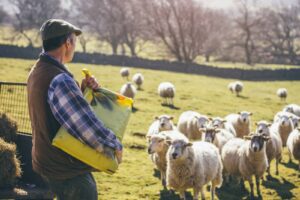Global livestock sector in urgent need of standardised measurement system for GHG data
14th March 2023
A new whitepaper published by EIT Food, in collaboration with Innovate UK KTN, outlines six priority recommendations which, if implemented, would support the ruminant livestock industry to achieve a transition to Net Zero.
One major challenge outlined in the whitepaper is that greenhouse gas (GHG) data is not currently being captured from the majority of farms in the UK and Ireland. Priority recommendations include the urgent need for an internationally agreed and standardised measurement system to monitor GHGs from the livestock sector, so that the effects of any changes or interventions can be monitored and verified over time.
Further recommendations in the report include actions for policy makers, the deployment of innovative solutions and additional research needed to enable the transition of the ruminant livestock sector to Net Zero. The whitepaper focuses on the UK and Ireland, but recommendations could be relevant across the global ruminant livestock industry.
The six priority areas identified and recommended in the whitepaper are:
- Urgent standardisation of GHG data for benchmarks and baselines. This is vital to allow the effects of any changes or interventions to be monitored and verified over time.
- Optimising the age of ruminant livestock slaughter to cut methane emissions. This requires optimising the efficiency and productivity of the animals to produce the same amount of beef or milk in a reduced time frame.
- Introducing policies that reward farmers to support the transition to Net Zero. The involvement of farmers will be essential to support farmer engagement and confidence in proposed impact solutions.
- Expanding the network of demonstrator farms to enable research, knowledge transfer and training around new technologies to accelerate the transition to Net Zero.
- Promoting land management strategies for Net Zero. This includes transitioning to agroecological or regenerative agriculture practices which are designed to enrich soils and increase biodiversity.
- Improving understanding of the complexity of carbon sequestration to ensure a holistic response.
The report highlights the diversity of systems, species and geographies across the ruminant livestock industry, recommending that a combination of solutions will be required to enable its full GHG emission reduction potential.
Jayne Brookman, director of EIT Food North-West, said: “The ruminant livestock industry has a critical role to play in achieving the ambition of Net Zero emissions by 2050. In order for the ruminant livestock industry to transition to Net Zero, input and support will be required from all players along the supply chain, as well as adoption by farmers.
“We hope that the recommendations in this whitepaper will help a wide range of stakeholders, from farmers to investors and policymakers, to take meaningful action that will support the ruminant livestock industry to achieve Net Zero.”

